The US in microcosm: Dan Snow discovers the battlefields and dance halls of Texas

There’s no ambiguity about Texas. It’s an ideal place for anyone suffering short-term memory loss. Every five minutes someone tells you that you’re in Texas. And that Texans are friendly. But don’t mess with them. After about 200 repetitions, I got the message. If you are tucking into vast mounds of meat, watching pickups crawl by blaring country music, sipping a beer and your fellow patrons are men in Stetsons and Cowboys jerseys, you are pretty confident that you are in Texas.
Every Sunday afternoon the town of Gruene, just north of San Antonio, is flooded with locals – and a few out-of-towners doing their best to fit in. It was founded by German immigrants who clung to their beer but ditched their language. My wife Edwina and I strolled down the main street stopping here and there in junk shops and general stores with jars of candy in the window and leather ammo belts hanging on the door.
A perfect winter sun sent us scurrying into dusty courtyards where tiresomely good-looking and talented young men played their guitars, singing mostly of women and the Texan spirit of adventure. We went on to a dance hall, a wooden structure with open sides and ceiling fans working furiously to move the hot air around. A band played country music while the community danced and drank and danced some more. An 80-year-old woman, Betty Jo, danced for an hour straight. It was her birthday, and she earned a heartfelt round of “Happy Birthday” when the band launched into it.
My wife and I were on a trip away from the children. Every year we take a mini-break out for an adventure. Destination selection is always a challenge, but San Antonio seemed to have everything – a world-class battlefield, a lively restaurant and bar scene, interesting criminal justice innovation for my penal reform-obsessed beloved, a hinterland of towns peopled by swaggering, pickup-driving cowboys and a pleasant winter climate. It was also a swing district in the US midterms in which Republicans and Democrats were fighting to capture a constituency that stretched along the border with Mexico for an extraordinary distance, equivalent to almost the entire length of Britain. San Antonio delivered – we just wished we’d had longer to explore more of Texas.
The band reached a frenzied climax. The fiddler stamped the wooden planks beneath his feet so hard I was terrified he’d go through the floor. The charismatic vocalist bade us all a wonderful afternoon and we staggered out, ready for our first experience with Texan barbecue. We walked down to the river beneath a canopy of tall trees to the legendary Gristmill, in a semi-derelict old saw mill in which you can eat beside the burbling stream.
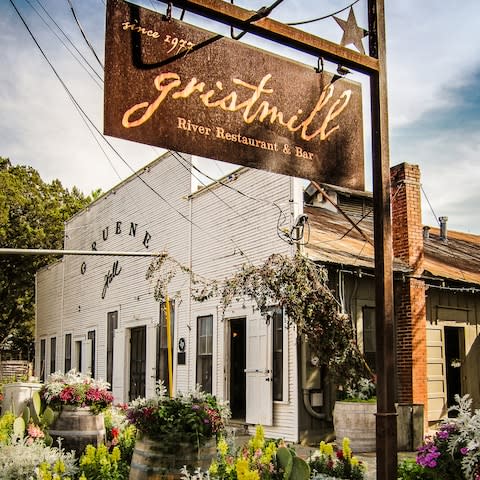
Sienna, the waitress, was from several hours west of the San Antonio area and had travelled here to escape the crushing conservatism of her community. As she chatted she hauled out gigantic platters of meat, glazed in sweet, brown sauce that rapidly overwhelmed us. We declined the offer of a box to put leftovers in; even the idea of waking up to a mound of yesterday’s meat the following morning was deeply traumatic. We slumped in a cab and glided along the freeway back into San Antonio while the driver explained that his wife and his daughter were no longer talking over the latter’s opposition to Trump. His daughter went to college a Republican and came out a Democrat. Now she works for the party. She sent her dad a picture of her meeting Barack Obama and his wife refuses to display it. He put it in his own little snug next to his TV.

San Antonio, combined with Austin, a couple of hours north, constitutes a liberal nexus often at odds with the broadly conservative character of the rest of Texas. I walked along the river that snakes through the city, and was overtaken by juice-quaffing creative types in yoga pants and hipsters on scooters. It is a walking city with the river at its heart. Industrial buildings have been regenerated, breweries are hotels, smoke stacks beautified with murals. Installation art pops out from every turn. Restaurant chains are nowhere to be seen as independent vendors offer up falafels, sushi, quinoa and vegan fare.
The highlight on my trip was the Alamo. I explored the battlefield at dawn, with the wonderful Texas historian W F Strong – square-jawed, steely-eyed with a ramrod straight back and a deep pride in the Lone Star State. I asked him what his first name was and he replied: “Call me W F, it’s a Texan thing.” He wove story and myth together and explained why the Alamo was hallowed ground. We stood where supporters of Jim Bowie, the ultimate frontiersman, claim that he went down fighting like a “wildcat”. In the faintest of whispers, W F confided that some say Bowie surrendered. Our eyes met and we silently agreed never to mention it again.
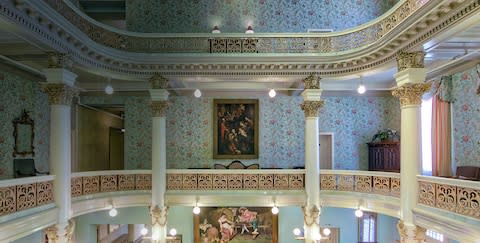
We ate afterwards in the magnificent 19th-century Menger Hotel next door to the fort, where Teddy Roosevelt once raised a unit of “roughriders”, a new generation of American heroes to take the fight to the nation’s enemies. As we ate grits beneath chandeliers and ornate balconies, W F told me how Oscar Wilde had once stayed here and lectured on interior design. He later complained that Texans could not sit still during the talk, and kept heading to the bar to refill their beer glasses.
Speaking of recharging glasses, Edwina and I had an appointment with a couple of the many bars, thrilled at the prospect of a sleep undisturbed by rogue children. We drank lurid cocktails in pickle jars sitting inside a giant copper still. We chatted to the super-liberal, diverse, cosmopolitan, Trump-hating clientele. Just a few miles away, the other America cheered their president on. San Antonio and its surroundings are the US in microcosm. Two nations that think, look and act differently. The privilege of the traveller is to switch between the two.
Dan Snow is a television presenter and historian. His new book On This Day in History, published by Hodder & Stoughton (£14.99), is available through Telegraph Books (0844 871 1514; books.telegraph.co.uk) for £12.99, including p&p.
How to do it
Audley Travel (01993 838755; audleytravel.com) offers a 14-day Texas Trails Self-Drive from £2,620 per person, based on two people sharing. The price includes all accommodation, fully insured car hire and international flights. The trip takes in Houston, San Antonio, Austin, Graham, Fort Worth and Dallas.
Which Texan city is right for you?
Best for music: Austin
The Texas state capital (austintexas.org) likes to sell itself as “the live music capital of the world”. While this is quite a boast, there is no doubt that Austin knows how to put on a noisy show. Venues range from the grand Paramount Theatre (austintheatre.org), which has held its poise on Congress Avenue since 1915, to the busy Cactus Cafe (cactuscafe.org), for new bands. Then there is South By Southwest (sxsw.com), above, the annual extravaganza of music, theatre and comedy that takes over the city every spring (and will do so again this March 8-17).
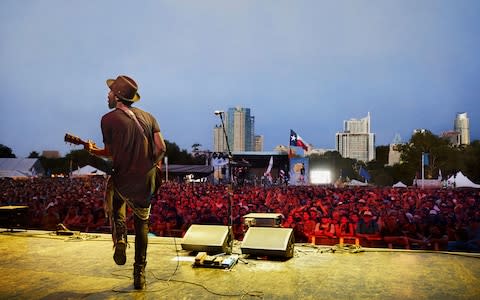
Best for Texas tradition: Fort Worth
There is a distinct cowboy culture to Fort Worth (fortworth.com) – not least in its Stockyards (fortworthstockyards.org), the 98-acre complex which operated as a livestock market in the 19th and 20th centuries and is now revitalised as a nest of shops, restaurants and hotels. The West also sings in the National Multicultural Western Heritage Museum (cowboysofcolor.org), and in the National Cowgirl Museum and Hall of Fame (cowgirl.net), where a macho side of the United States acquires a female perspective.
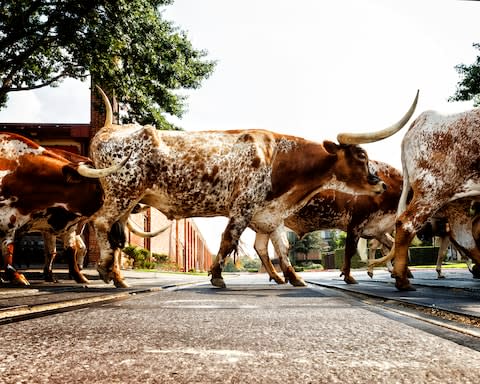
Best for history: San Antonio
The city (visitsanantonio.com) occupies an emotive groove in the soul of the US. The Alamo (thealamo.org) was the site of the much-saluted 1836 battle between Mexican troops and would-be independent Texans. San Antonio Missions National Historic Park (nps.gov/saan) also charts the entwined heritage of Texas and the nation next door, in the form of four missions built by Spanish settlers.
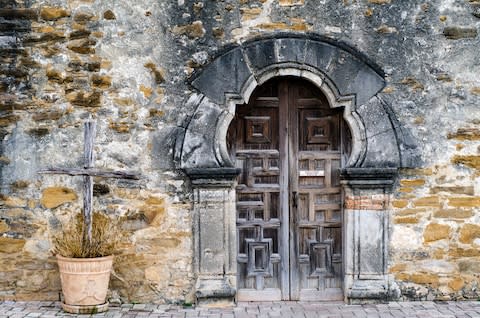
Best for art: Houston
The biggest city in Texas (and the fourth-biggest in the US as a whole), Houston (visithoustontexas.com) swaps its colossal scale for subtle brushstrokes in its intriguing art museums. Its Museum of Fine Arts (mfah.org) offers greats from Canaletto to Renoir, while the Contemporary Arts Museum (camh.org) keeps things modern, with touring exhibitions of work by 20th and 21st- century visionaries. The Blaffer (blafferartmuseum.org) has a similar of-the-moment identity, presenting around eight shows a year of installations, sculpture and photography.
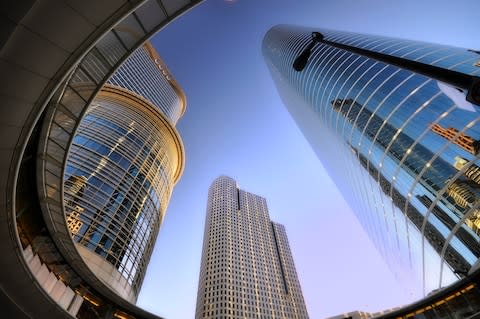
Best for food: Dallas
Each of Texas’s major urban hubs would declare itself the state’s king of the kitchen, but Dallas (visitdallas.com) can support the claim through sheer number of restaurants. West Lovers Lane in Bluffview is home to chic affairs such as José (jose.mx) – where daring Tex-Mex dishes are served by feted chef Anastacia Qui?ones. McKinney Avenue in Uptown is similarly alive with gourmet options – such as Namo (namosushi.com). And you could eat forever on the Belt Line Road in North Dallas – where every imaginable cuisine is cooked.
Chris Leadbeater
